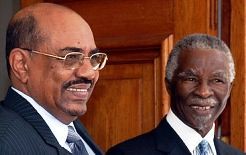
President Omar Hassan al-Bashir of Sudan along with former head-of-state Thabo Mbeki of the Republic of South Africa. Both nations have sought an independent foreign policy towards Africa and the rest of the world., a photo by Pan-African News Wire File Photos on Flickr.
April 25, 2012 10:50 pm
African Union issues deadline to the Sudans
By Katrina Manson in Nairobi
Financial Times
The African Union has given warring foes Sudan and South Sudan three months to resolve a long list of disputes or face binding international arbitration.
Diplomats have scrambled to force the hands of the world’s newest neighbours, which parted following decades of civil war last year. South Sudan shocked its allies when it invaded Heglig oilfield north of the de facto border this month, while Sudan is conducting fatal bombing raids on the South.
“The level of bitterness, anger and distrust on both sides has never been so high,” said Ramtane Lamramra, AU commissioner for peace and security, late on Tuesday.
The AU said it would seek UN Security Council endorsement of “final and binding solutions to the post-secession relations” if negotiations failed to produce an agreement within three months.
The UN Security Council, which met on Tuesday, has also demanded “an immediate halt to aerial bombardments by the Sudanese forces . . . and return to the negotiating table”, adding it had been asked for Chapter 7 endorsement of the new AU roadmap, which would mandate military force. The AU also demanded a return to talks within two weeks.
Mahboub Maalim, executive secretary of IGAD, a regional bloc that counts Ethiopia, Uganda and Kenya among members, said it was already playing a significant role, with envoys stationed in both capitals.
“I have no doubt in my mind that peace talks will resume and even now they’re going on behind doors,” Mr Maalim told the FT, describing shuttle diplomacy and a string of high-level phone calls. “This is our home turf, this is our business – there’s no way we can be bystanders. Three months is enough time [to settle] everything.”
The two countries have yet to agree how to divide everything from disputed territory and the continent’s longest border to citizenship rights and transit fees for oil, which was produced in the South but exported through the north until South Sudan stopped production in February.
Despite concerted international pressure it is not clear whether either side is prepared to go back to talks. Both have said oil will never again flow through the north, which could deprive mediators of a crucial economic negotiating asset.
Salva Kiir, South Sudan’s president, who cut short a six-day visit to China on Tuesday, appears to have netted fewer gains from the trip than hoped, which may help force South Sudan back to talks.
“Our special envoy to Africa will soon visit the two countries to continue urging talks,” said Liu Weimin, Chinese foreign ministry spokesman, on Tuesday. The new envoy, Zhong Jianhua, will also co-ordinate with US counterpart Princeton Lyman.
South Sudan said last week, however, that the mediation process needed more “clout” and wanted to “undertake a critical review” of the AU’s High-Level Implementation Panel, led by Thabo Mbeki, former South Africa president. Many southerners complain negotiators and advisers are based in Khartoum and are not impartial.
“Its proposals have crashed too many times, and it has little leverage over the two capitals,” says Rift Valley Institute fellow Magdi El Gizouli of the AUHIP, who favours a Sudans conference with broader participation from regional representatives as well as the UN and the AU.
“We are trying to see what we can do to beef up the mediation and help it deliver something urgently needed by both sides,” said a foreign diplomat. “Turning off the oil added a pretty rigorous time dimension for this; before both sides could pretty much tick along, but neither side can afford for this to delay any longer.”
No comments:
Post a Comment